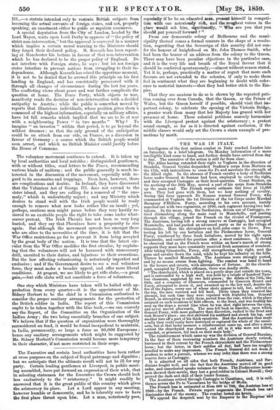The volunteer movement continues to extend. It is taken up
by local authorities and local notables ; distinguished gentlemen, with or without titles, send letters to the Times, recommending various kinds of uniform ; and the public generally is much in- terested in the discussion of the movement, especially with re- gard to its accessories and trappings. Even here, however, there are complications and doubts. In Ireland, they have discovered that the Volunteer Act of George III. does not extend to the sister island, and they are calling for a removal of "the ano- maly," which is undoubtedly unjust ; and any Ministry which desires to stand well with the Irish people would be ready enough to remove what now looks rather like an insult ; yet, perhaps, cautious men might pause before they very hastily re- stored to an excitable people the right to take arms under what- soever pretext. The Irish Phcenix has not been so very long buried, and they say that Phoenixes have a propensity to rise again. But although the movement spreads too amongst those who are alive to the necessities of the time, it is felt that the War Office restrictions go far to prevent it from being accepted by the great body of the nation. It is true that the latest cir- cular from the War Office modifies the first circular, by explain- ing that the volunteers will not be harassed with unnecessary drill, unsuited to their duties, and injurious to their avocations. But the law affecting volunteering is notoriously imperfect and exclusive ; and if the Government desire to see a real volunteer force, they must make a broader appeal, and offer more liberal conditions. At prevent, we are likely to get rifle clubs,—a great gain,—but rifle clubs will not constitute a force of volunteers.


























 Previous page
Previous page